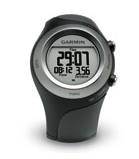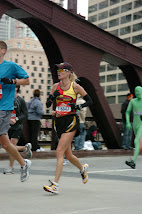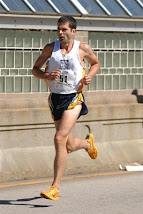Race Goals. I had essentially two goals in Houston, the most important of which was to qualify for a guaranteed starting position in New York (requiring a 3:38:00, a slight edge over my 2009 Chicago time of 3:38:22). The more challenging goal was to run a 3:35-something. Anything in that range (3:35-3:38), and I would be ecstatic. My workouts indicated this was possible, but I intended to play it conservatively. I wore two pacing bands, one for 3:35:00 and one for 3:38:00. Neither of which got a single glance the entire time.
Pre-race. The average temperature of my two longest runs this season was 20 F. Contrast that to 65 F at the start in Houston, soggy, muggy and we were promised bits of rain. The announcer warned we'd be routed to safety in the event of lightning within 10 miles of the course. I figured with the erstwhile rain, I'd be cooled enough and followed a "non hot" marathon pre-race routine. I had not had any water since I woke at 4:30 AM (Ok, I mean finally got out of bed, I didn't sleep), when I downed my usual 16 ounces. Hydration is good; port-a-sans stops are not.
The twin booms of the half marathon and marathon starting guns reverberated, and soon, I was off onto the wet streets of Houston with a steady rain that was seen more than felt.
I've broken into sections of the race that follow the "unofficial" splits that family / friends sent me from text messages / chip times as I crossed the various check points. My Garmin acted up before during and after the race, and I ended up losing all my data long before I could download it. I don't really remember many miles in great detail anyway, and it's best to take this in chunks.
Despite the thirst, during this period the miles were seductively easy. I was trying to slow down, but kept finding myself below 8:00. The pace didn't feel right. It felt too slow. Maybe my Garmin was wrong--it froze on me earlier, but then I was figuring the gun time vs. my start time and decided it must be right. I needed to slow it down to 8:11.
10K--50:21 (8:06 overall). At last, mile 4 there was a second water station. On the right. Crap. Well, I managed to get over, but got the tiniest tablespoon of Gatorade and I nearly choked on it. It was mile 6 before I managed to grab two cups and downed them both without slowing. This would probably mark the beginnings of why this race was a struggle--it was warmish, quite humid, marked by occasional wind gusts and rain. I got behind on water and electrolytes, and never was able to catch up.
Still, I'm nudging the pace up (trying to get to 8:11 and hold--which means slowing down), but the miles feel like water. I'm effortless. My legs feel fluid, and I think this just might be my day.
There are a few gentle "rollers" usually in the form of overpasses in the first 10K. None of them in particular are worth mentioning, or even troublesome--but they are there and keep it interesting.
15K--1:15:49 (8:08 overall). The next 5K are really flat, and still, I am feeling wonderfully well, attempting to pick up fluid at every stop, but I now realize I'd probably fallen way behind and somewhere in here, I can't logistically manage water without stopping, so I skip a station. I'm finding the 8:11s more often, and running all of this at 8:11 or 8:12 pace, right on target.
20K--1:41:30 (8:10 overall). Still in a very flat portion of the course, I am getting warm but still feeling good, and managing my pace of 8:11 very well. This is perhaps my favorite part of the course, as we pass by lovely homes and Rice University.
Half--1:47:13 (8:10 overall). Just before we turn north on Weslayan, we cross the half-way point. I'm exactly on schedule, a few seconds to spare, but overall feeling good. This is the last checkpoint where I can say that.
25K 2:07:39 (8:13 overall). Just past mile 14 is the only prominent hill on the course, an overpass. Nothing terrible, but my plan was to let this mile go. I expected to gain 20-30 seconds on the mile and not try to make it up. As it happens, I crossed mile 15 in 8:28, just about on schedule. And I plan to pick the pace back up. But it doesn't come to me.
Instead, for the first time, I find the 8:11 pace requiring effort. And the nausea has begun. I worry, and hope this passes. I switch totally to water, not sure what's wrong, but I realize I'm not far along enough to be feeling this bad. I eke out an 8:12 at mile 16, and then, nearly throw up. I stopped looking at my watch, thinking, ok, it is what it is. If you can just run a comfortable pace in for the remaining 11 miles, so be it.
I pray for lightning.
The cramping began. First, in my calves, but soon spreading to one of my glutes and the nausea intensifies and the pain is intense. But, the pain isn't the real problem--the fact that the muscles are locking up is. My calves aren't even flexing anymore, and I realize I'm in trouble. Lightning doesn't come.
I take a quick walk break, and then start to jog again. I carry on like this, realizing at 18 miles that eight miles to go in this condition can be toughed out--but at what cost? At the very least, I'm worried something is going to tear. And I somehow need to get through the nausea, which is now making me dizzy.
30K 2:35:51 (8:21 overall) Somewhere in here I cross over 30K. I start walking again, give up on the lightning, and realize it's time for me to call it a day. I'm so far off of my goal, and the cost to actually make it to the finish will be exceedingly high. So high, at best, I will need a lengthy recovery and start over at zero for the season, and at worst, I might face a long-term injury.
I pulled over into the aid station near mile 20 for the long wait. So long, in fact, I think that the walk / jogging it in would not only have gotten me to the finish area faster, I wouldn't be questioning if I should have just done it. I have two hours to contemplate my decision. But any difficult decision is just that--difficult. I'm not sure there is a 'right' or a 'wrong' answer here, but this ultimately was a 'good' decision for me.
I wouldn't suggest that pulling over and calling it quits is a typical solution to a 'bad' marathon. In fact, in most cases, one should really press on. If you're truly in doubt, consider that the marathon isn't well set up to cart non-finishers back to the end, and you'll likely wait for a long time for the privilege. Walking it into the finish might be the best option.
I thought I'd wrap up with some conclusions about when you might--and when you might not--want to consider ending your "bombed" marathon.
When NOT to drop out of your marathon:
1. Your first marathon. This is a really important event, and it's an experiment of the distance. If you are a novice like I was, you've likely not gone more than 20 miles. Unless you risk serious, imminent bodily harm--pulling out of your first marathon will fill you with long-lasting doubts. You'll probably hit a point you wish you could quit. Don't do it.
2. Your goal is to finish. Sometimes, the goal is a very specific one--like Houston was for me. Other times, it's important for other reasons. When I ran Boston in 2009, I would have walked, crawled, hopped, pushed or dragged myself across the finish line, no matter what suffering or what my time was. Wearing my Boston gear for which I had worked so hard was essential for me. Likewise, if your marathon is plugging hole in a set (e.g., 50 marathons in 50 states, all world major marathons), you probably want to ensure you've leveraged your investment. If you want it, chances are probably 99.5% you'll pull it off, even if you think you can't at mile 20. Quitting is simply not an option.
3. You haven't done many marathons. The cost of dropping out of the marathon if you only have a few behind you is very high. It's a decision that will haunt you in ways you haven't dreamed. Unless you have quite a few solid marathons behind you, you're probably better off toughing it out.
"If you quit the race for reasons other than abnormal fatigue, the sense of failure with stay with you for a very long time and will increase the likelihood that the same thing will happen in the next race. Extreme fatigue is, by itself, not a reason to quit any race. Much of the marathon battle is mental anyway, and often fatigue becomes more bearable the nearer you get to the finish... Should you quit, remember, there is no second chance." The Lore of Running 4th Edition, Tim Noakes, p. 631
When the decision to drop out might be a good one.
1. You have a very specific goal in mind, and reason to believe you can attain it--and you're not even close. By dropping out early from the marathon, you can probably treat it as a tempo run and be ready to race again in just a few weeks. Finishing this race way off your target pace, draining your body to its maximum will prevent you from a successful marathon that is back on goal any time soon. Let's face it--the marathon season is a huge investment. You simply don't need another marathon "notch," but you DO need (or want) your goal.
2. Chest pain, severe injury (such as broken bone), shortness of breath, extreme dehydration or symptoms of heat stroke. You are risking more than your ego here. Best case--stop off at the medical tent and be evaluated. If your symptoms are serious enough, they won't let you back out.
If you've ever had to drop out of a race, I'd love to hear about it. My decision is barely 36 hours old. I'm only beginning to understand the ramifications--both good and bad.








Wow Alex. What rotten luck. You sound like you were set up for a great race in the beginning. Its obvious the dehydration got to you - nausea and cramping.
ReplyDeleteI know what its like to be cramping during a marathon and youre really at the mercy of how much your muscles are spasmming. There's really no way to stop it other than figure out ways not to exacerbate the problem. And by then, your pace is already suffering. Being where you were in the race, I would have done the same.
What are your plans now? Have you decided to target anything in the near future?
Thanks, Herb. It's helpful to hear other marathoner's thoughts of the situation and I appreciate your assessment more than you know!
ReplyDeleteI have signed up for three races, two half marathons 4/2 and 4/16, and then Chicago in October. Eight weeks away, I've never focused on the half, but I'm excited to try. --Alex
Wow, sounds like an awesome run that turned. Sorry things went bad.
ReplyDeleteTen years ago I dropped out of a certain event. I was relieved at the moment I made the decision to pack it up, and for the next year I was doubtful and regretful. I questioned myself, my determination, my toughness. I worried I disappointed others.
Ten years on, I realize if I had stuck it out, I would have forgotten the whole thing. Dropping was a much bigger deal. Another lesson in compassion, I guess.
Lorraine, Indeed. I'm hopeful I can leverage this.. for the better and that it will not be wasted. Thanks for sharing your thoughts and experience! --Alex
ReplyDelete